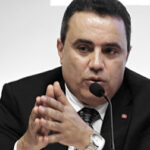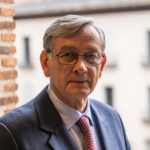In the framework of the Forum, the Club de Madrid co-organized a High Level Panel on Democratic and Inclusive Leadership to Prevent Violent Extremism, where CdM members Danilo Türk and Mehdi Jomaa were key speakers, along with Dewirini Anggraeni from Mothers School Project in Indonesia and Alexander Mark, Chief Specialist, Fragility, Conflict and Violence Group, World Bank.
The panel discussion addressed the idea that divisions, exclusion and polarisation create the conditions of alienation and marginalisation out of which violent extremism grows. Therefore, there is an urgent need to build inclusive Shared Societies, locally, nationally and indeed internationally, which prevent the emergence of violent extremism, facilitate the reintegration of those who have been tempted by the path offered by violent extremism, avoid a backlash from the wider community, and help the wider community to understand and respond positively to the challenges. “Security approaches are not enough to confront violent extremism” said Danilo Türk during the High Level Pannel.
Through its long-running initiative on Shared Societies, CdM supports a holistic approach to sustainable development integrating social, economic and environmental dimensions, with social inclusion at its core. Former Prime Minister of Tunisia Medhi Jomaa said that “the most important thing is an inclusive dialogue.” In managing the transition to democracy, Mr. Jomaa said that an inclusive approach had been “the key ingredient for success of Tunisian transition.” During President Türk’s intervention at the panel he said that there is “little evidence that poverty causes violent extremism but plenty of evidence that exclusion and humiliation do so.” “Inclusion needs to be the center of policy making and CVE” said former Slovenian president and Club de Madrid member.
Divisions, exclusion and polarization are the base from which violent extremism grows. Preventing these situations from happening through facilitating the reintegration of those who have been tempted by the path by extremist groups, and by helping the community as a whole to understand and respond positively to these challenges, are key and highlight the importance of building inclusive Shared Societies, at all levels, to counter violent extremism and allow for further progress on development.
The mission participated in a breakfast discussion at the Georgetown University on promoting shared societies and the policy and governance challenges. The conversation was hosted by CdM Member President Laura Chinchilla from Costa Rica, Visiting Professor in Georgetown, and President Türk and Prime Minister Jomaa. The objective was to bring practical approaches to students and professor on the governance dilemmas about how to promote inclusion and shared societies based on the lessons learned by three formers head of states and government.
Club de Madrid Members also participated in a Round Table on Global Perspectives on Violent Extremism and Shared Societies, co-organized with Search for Common Ground. The meeting gathered representatives of NGOs, Think Tanks and academia, international community, U.S. administration and INGOs & Networks, with the purpose of discussing priorities and strategies on CVE and how shared societies approaches are being advanced and adopted around the world. CdM Members Türk and Jomaa, shared their global experiences, and outlined the Club de Madrid’s “Shared Societies” approach and the “Madrid+10” initiative on preventing and countering violent extremism.
The CdM delegation also held bilateral meetings with representative of the United States Department of State, USAID and World Bank´s senior officials, with the purpose of presenting CdM activities and explores potential collaboration opportunities.

